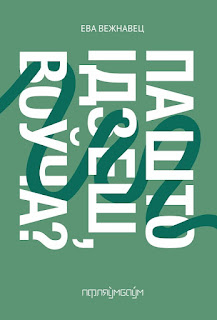Калі Рына, галоўная гераіня кнігі, выходзіць з аўтобуса і крочыць да роднай вёскі, уздоўж пустэчы, леса і тхлані, я пазнаю краявід і адчуваю пах прыцемак і вечаровых дрэваў. Ды і цяжка было б уявіць беларускага чытача, асабліва ў цяперашнія часы буйной эміграцыі, які б нутром і скурай не адчуваў гэтага вяртання. Рына вяртаецца не толькі дадому, не толькі ў сваё мінулае, але і ў трагічнае мінулае краіны дваццатага стагоддзя.

Раман ахоплівае сто гадоў, з 1912 па 2012. Менавіта столькі пражыла бабуля Рыны, развітанне з якой хутка ператвараецца ў бясконцыя, бязлітасныя карункі мінулага. Што яшчэ чакае Рыну дома? Змрочны погляд бацькоў і падвыпіўшая дзяўчына з вёскі, якая хоча паведаць Рыне нешта важнае. Але перш, чым яна паспее гэта зрабіць, трэба нанова перажыць мінулае. Бабуля Рыны - Дарошка, Дарфейка, шаптуха, вядзьмарка - хутка становіцца другой цэнтральнай фігурай кнігі. Менавіта праз яе мы адчуваем крывавы подых дваццатага стагоддзя. Забойства габрэяў, раскулачванне, немцы і паліцаі, партызаны, "тры каласкі" і гэтак далей. Бясконцыя цыклы чалавечай трагедыі, якія хватаюць за пяткі і цягнуць назад, у няўмольную багну мінулага.
Якое, дарэчы, жыве і добра сябе пачувае. Калі Вежнавец піша пра ўсе гэтыя скрадзеныя швейныя машынкі, то перад вачыма паўстае ўжо не першая палова дваццатага стагоддзя, але і ўсё тое, што адбываецца сёння, з намі і каля нас. Мы пазнаём сучаснасць і мы пазнаём мінулае. Так, я памятаю, як апускаўся той самы ліпеньскі вечар, пра які піша Вежнавец. Памятаю, як у дзедавай хаце збіраліся суседзі, каб увесь вечар маўкліва і бездыханна глядзець тэлевізар. У гэтых апісаннях, асабістых, а часам нават інтымных (ёсць вельмі моцны і прыгожы эпізод, калі Рына сыходзіць з дому праз першую менструальную кроў, якая падаецца ёй ракам), адчуваецца прысутнасць самой аўтаркі. Гэта яна вяртаецца дахаты, яна адчувае подых ваўкоў, яна ў чарговы раз перажывае жыццё сваіх продкаў.
Дарэчы, пра ваўкоў. Ёсць такія назвы... Воўк, які паўстае на вокладцы кнігі, так ніколі і на з'яўляецца на працягу апавядання, але менавіта ў гэтым яго пачварная моц, яго вусцішная хватка. Ён паходзіць са шматлікіх беларускіх казак і прымавак, і ён не толькі дадае адмыслова беларускі каларыт знакамітаму біблейскаму "Domine quo vadis?" Ён існуе як нешта непазбежнае, як тая канстанта, якая нябачна кіруе жыццём. А калі не кіруе, дык назірае. А калі не назірае, дык увесь час прысутнічае ў нашай падсвядомасці.
У нядаўнім інтэрв'ю Вежнавец казала, што раман гэты спачатку займаў 500 старонак, і ўжо потым яна вырашыла скараціць яго амаль утрая. У абсалютнай большасці выпадкаў такое рашэнне падалося б мне выдатным. "У пісьменстве трэба забіваць сваіх каханых", як некалі Уільям Фолкнер завяшчаў пісьменнікам, якія баяцца выкінуць з кнігі любімыя словы і нават сюжэтныя лініі. Дарэчы, я ўжо шмат разоў пісаў пра тое, што люблю кароткія раманы. Але ж гэтым разам большы памер кнігі быў бы цалкам апраўданы і пазволіў бы зрабіць фінал кнігі больш эмацыйным і меней скомканым. (Удакладню, што рэч ідзе не пра эпілог; эпілог у рамане нагадвае сем труб з "Кнігі Апакаліпсіса" і пакідае вельмі моцнае ўражанне.)
Раман "Па што ідзеш, воўча?" - гэта важны твор для сучаснай беларускай літаратуры, і гэтым разам немагчыма аспрэчваць прэмію Ежы Гедройца, якую Ева Вежнавец атрымала два гады таму. Раман адначасова змрочны і прывабны, вусцішны і чароўны. Ён пакідае пасля сябе горкі смак, але смак гэты настолькі родны і непазбежны, што нам застаецца толькі прыняць яго і палюбіць. Раман робіць шмат сумных высноў ("Горшай хваробы, чым чалавек, няма на свеце"), але мне падаецца, што ў пераемнасці пакаленняў ёсць пэўны аптымізм. Так, ёсць шматлікія хваробы, якімі прыйдзецца перахварэць, але захоўваецца па-ранейшаму і надзея, што перахварэўшы ў чарговы раз, мы адчуем нарэшце, як яны знікнуць назаўжды. Калі б, канешне, у свеце існавала нешта падобнае да завяршэння.

